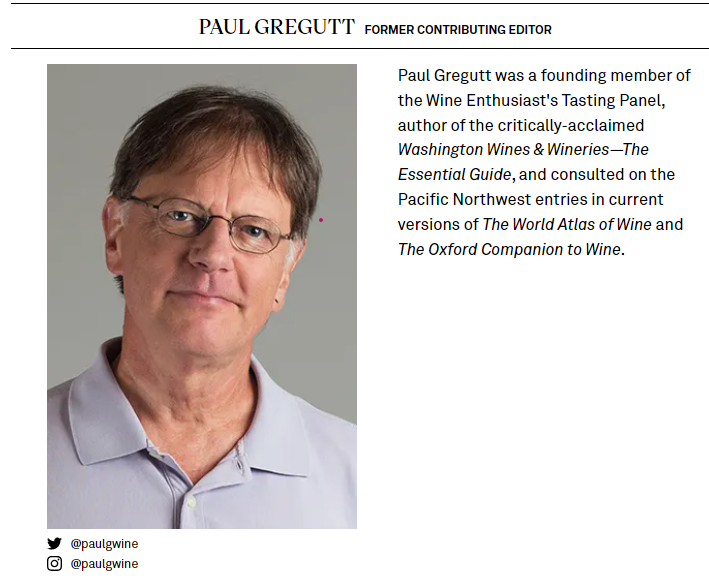You Want Your Wines Reviewed? Do This.

| Most wineries large and small sends samples out for review. When, what and to whom? PAUL GREGUTT JAN 29 I’ve been reviewing and scoring wines for about 35 years now, but I’ve never gotten clear about how wineries make decisions about submitting samples for evaluation. The major print publications have always published specific guidelines, and all are different. Some charge money, some don’t. Some promise to taste and/or review everything, some make no such promises. Some assign reviewers regionally, some (notably Parker) built their reputations upon a single all-star palate, most reviews are done by committee. But back in the pre-digital days, there were a relatively small number of influential places to send the wines, whatever the rules you had to follow. For wineries these days the reviewer (or influencer) playing field has become huge. You have the old school print publications (most with online outposts); the newsletters (digital and print); the independent bloggers, Tik-Tak’ers, Substackers et al; the consumer-based reviewers on e-sales sites, and of course the still important ranks of full-time newspaper journalists. If you are a small, artisanal, independent winery you may decide not to send any wines anywhere, knowing that you’ll probably be ignored by the big publications. Or you may pick and choose to send a few wines to a handful of reviewers who feel might do you the most good. Who makes that choice? – the winery owner, the winemaker, the sales manager, or the person in charge of tasting room and DTC sales? And what criteria does that individual follow? I’m sure that there are almost as many different answers to these questions as there are wineries that send out samples. It seems to make sense to me that if you are a winery with limited production and a tight regional focus, you’d want to seek out comments from a knowledgeable, well-established reviewer with a deep background in your region. That said, for any reviewer it’s important to have both a specific regional expertise and a broad knowledge of the global wine market. If you have one or the other, but not both, your reviews are going to be biased or at the very least lacking perspective. My advice to any winery grappling with when, what and where to send samples is to get acquainted with the work of the persons or publications you are going to submit wines to. Be familiar with any and all guidelines and requirements, and follow them exactly. Don’t send one or two wines once in awhile. Send a broad representation, including your best wines, most limited wines, so the reviewer can get a meaningful overview of your entire output. And don’t just send a few bottles once and then never again. Reviewers build a sensory library over time, and looking at consecutive vintages is of paramount importance. Some weeks ago I was contacted by the new Sales Director at Efesté, a winery I followed closely for some years but had not tasted in the past decade. He sent a selection of wines which I looked forward to tasting, but as I went through them I felt somehow that they weren’t the best the winery had to offer. I did some research and sure enough I’d been tasting some of the most widely available wines from their portfolio, but missing some of the more limited offerings. On the one hand, that makes perfect sense. Send the wines that you have in wide distribution. On the other hand, if your best wines are not in that group, you’re not likely to get the kind of reviews that will propel sales or even drive consumers to your website for a further look. In this instance I requested another shipment of specific wines that I remembered from past tastings, and they proved to be the standouts. Efesté Efesté 2021 Lola Chardonnay – Sourced from the Conner Lee vineyard, this is broadly fruity, to the point of losing focus. Rather simple apple and pear fruit leads into a sharp, quick finish. 420 cases; 14%; $38 (Columbia Valley) 87/100 Efesté 2022 Adrienne Chenin Blanc – These vines are part of the vast Columbia Crest vineyard, originally planted in 1979. Whether this particular wine has any of that old vine fruit in it is anyone’s guess. I’ve tasted many old vine Chenins and this does not show the same aromatic complexity, length or detail one would expect. It’s a solid, balanced wine that thins out quickly. 13%; $34 (Horse Heaven Hills) 88/100 Efesté 2020 Upright Merlot – The penetrating barrel flavors need more time, as they lend a sharp and bitter edge to the fruit. For now it’s all about the wood, with little reference to the grape or the terroir. 210 cases; 13%; $60 (Red Mountain) 87/100 Efesté 2021 lil’ mama Cabernet Sauvignon – A good, every day drinkable style, this is 100% varietal with mixed red fruits and a touch of espresso. Overall it drinks lighter than its alcohol, and should be consumed over the next five years. This is the winery’s most widely available wine (but not sold at the tasting rooms). 2932 cases; 14.5%; $?? (Columbia Valley) 88/100 Efesté 2021 Taylor Mag Cabernet Sauvignon – Named for one of the estate vineyards on Red Mountain, this 100% Cabernet saw half new French oak. It’s of moderate concentration, with clean fruit flavors of blackberry and cassis. There’s a smooth lick of coffee running down the finish with firm, astringent tannins. 472 cases; 14.5%; $39 (Red Mountain) 90/100 Efesté 2020 Ceidleigh Syrah – All stainless ferment and finished in French puncheons, this is a single vineyard, single clone estate wine. It’s surprisingly light other than the impact of the wood. At first the fruit seems to tail off, with ample aeration it comes back up and fills out the core. 369 cases; 14.5%; $50 (Red Mountain) 90/100 Efesté 2020 Estate Cabernet Franc – The estate’s Angela’s vineyard is the source for this 100% varietal expression. As with the Grenache, it is loaded with young vine flavors, the emphasis here on pretty pie cherries. It’s nicely balanced, forward and flavorful, though you won’t find the depth and detail of Cab Franc from older sites. Don’t get me wrong – this is well made and attractive. But it quickly fades into chalky astringency. Drink this over the next few years. 220 cases; 14%; $55 (Red Mountain) 90/100 Efesté 2021 Paulie GSM – Sourced from the Stone Tree vineyard, this is 42% Grenache, 37% Mourvèdre and 21% Syrah. It’s balanced and nicely proportions out the three component grapes, each adding to the final flavors. Scented with cut tobacco and spice, it layers currants, cherries, chocolate orange peel, a whiff of coffee and even a suggestion of minerality among the highlights. I’d suggest drinking this over the next five years while all the freshness remains. 330 cases; 14.5%; $?? (Wahluke Slope) 91/100 Efesté 2020 Tough Guy Red – This wine honors the owners’ son who faced a tough battle with cancer at a very young age. It’s a 60/40 mix of co-fermented Merlot and Syrah that nicely complement each other, yielding a broad, smooth palate with currant, black cherry and dark chocolate. It finishes with a streak of graphite and gritty, slightly earthy tannins.14%; $60 (Red Mountain) 91/100 Efesté 2020 Estate Grenache – This is the second vintage for this pure Grenache from the estate’s Angela’s vineyard. It’s a delightful bottle, with fresh and forward aromatics of strawberry and raspberry fruit. Those flavors follow, lightly dusted with cocoa. As is often true of young vines, it’s fruit forward, pretty and accessible, though lacking some of the depth and detail that older vines can offer. That said, it was bigger, fuller, richer and overall better when I returned to the mostly empty bottle on the second day; on the third day I finished it. Supported with juicy acids and tight, firm tannins, it finishes with a hint of dried tea leaves. Enjoy this wine over the next 3-5 years (if you can keep your hands off it!). 260 cases; 14.5%; $50 (Red Mountain) 92/100 Efesté 2020 Big Papa Cabernet Sauvignon – Sourced from 30+ year old Sagemoor vines (Bacchus, Sagemoor, Dionysus), this is the top drop from Efesté. It’s a muscular Cab, which deepens through the finish. Black fruits, chewy tannins and threads of espresso, black licorice and clean earth add texture and depth. Steak-friendly, this should be on any beef lover’s table. 14%; $70 (White Bluffs) 92/100 Efesté 2020 Knight Commander Syrah – Sourced entirely from the Ciel du Cheval vineyard, this is a beefy, fragrant, dark and tannic Syrah. Along with cassis fruits there’s a big slice of cut tobacco, a vein of espresso and a thin layer of dried herbs. A lingering spicy note carries through the finish. Tannins slide into a slightly chalky trail out. 15%; $60 (Red Mountain) 92/100 Purchase these wines here. Featured Wine Efesté 2022 Feral Sauvignon Blanc Sourced from the Evergreen vineyard, a cool climate site, this was one of the first wines from Efesté to explore wild (or feral) yeast fermentation. It’s less adventurous and more reliable these days, but still adds complex aromatics and a savory side to the flavor suite. The lush palate mixes citrus flesh and zest, pineapple and green melon. I love the way it lingers gracefully through a very long finish without a trace of an off-note. Highly recommended! 12.5%; $25 (Ancient Lakes) 92/100 Final thoughts… This Northwest Wine Guide is designed to showcase the boutique artisanal wines and wineries of the Pacific Northwest. Subscribing is free, and will remain so, though a bonus option may soon be added for paid subscribers. The best way to support my work is by subscribing and passing these columns along to friends and colleagues with your recommendation that they too subscribe. PS: My band, the DavePaul5, will be playing at AK’s Mercado on Friday March 8th – part of Walla Walla’s Guitar Fest weekend. Totally stoked for that! Walla Walla wineries take note – we are now filling up our calendar for the 2024 season. If we have performed at your winery previously and have not been in touch please send me a note and let’s get back on your schedule! Author: Paul Grugett, https://paulgregutt.substack.com/ |



